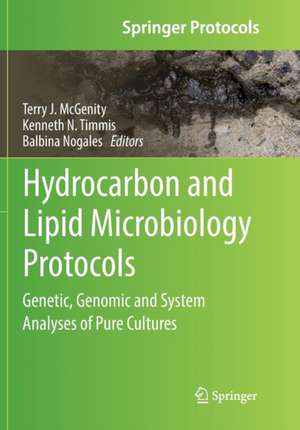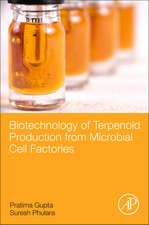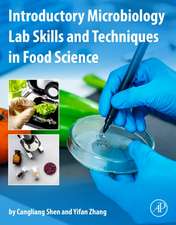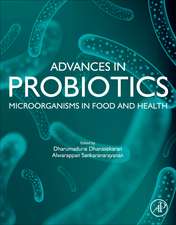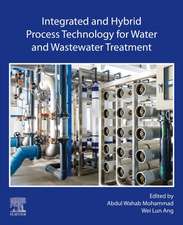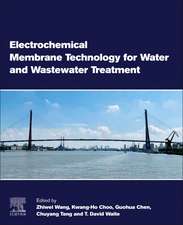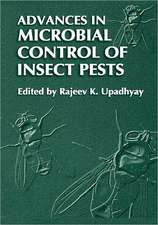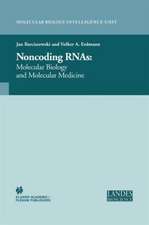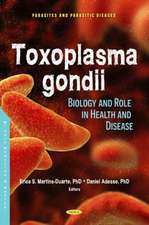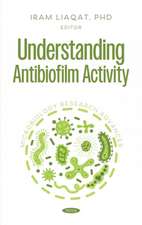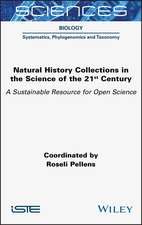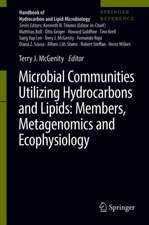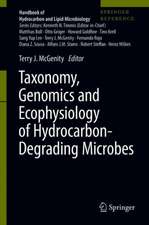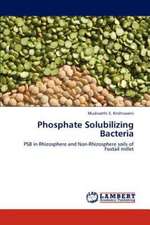Hydrocarbon and Lipid Microbiology Protocols: Genetic, Genomic and System Analyses of Pure Cultures: Springer Protocols Handbooks
Editat de Terry J. McGenity, Kenneth N. Timmis, Balbina Nogalesen Limba Engleză Paperback – 9 sep 2018
This Volume presents a comprehensive series of generic protocols for the genetic and genomic analysis of prokaryotic isolates. Genetic methods for functional analyses employ the latest cloning vectors, gene fusion methods and transposon mutagenesis systems, as well as systems for introducing protease-cleavage sequences into permissive sites in proteins under investigation. Genomic methods described include protocols for transcriptomics, shotgun proteomics, interactomics, metabolic profiling, and lipidomics. Bioinformatic tools for genome annotation, transcriptome display and the integration of transcriptomic data into genome-scale metabolic reconstructions are described. Protocols for 13C-based metabolic flux determinations and analysis of the hierarchical and metabolic regulation of fluxes through pathways are included. The Volume thus enables investigators to functionally analyse an isolate over the entire cellular range spanning the gene, the genome, the transcript repertoire, the proteome, the interactome, the metabolic network with its nodes and their regulatory hierarchies, and the metabolic fluxes and their physiological controls.
Hydrocarbon and Lipid Microbiology Protocols
Hydrocarbon and Lipid Microbiology Protocols
There are tens of thousands of structurally different hydrocarbons, hydrocarbon derivatives and lipids, and a wide array of these molecules are required for cells to function. The global hydrocarbon cycle, which is largely driven by microorganisms, has a major impact on our environment and climate. Microbes are responsible for cleaning up the environmental pollution caused by the exploitation of hydrocarbon reservoirs and will also be pivotal in reducing our reliance on fossil fuels by providing biofuels, plastics and industrial chemicals. Gaining an understanding of the relevant functions of the wide range of microbes that produce, consume and modify hydrocarbons and related compounds will be key to responding to these challenges. This comprehensive collection of current and emerging protocols will facilitate acquisition of this understanding and exploitation of useful activities of such microbes.
Din seria Springer Protocols Handbooks
- 18%
 Preț: 782.42 lei
Preț: 782.42 lei - 5%
 Preț: 1817.13 lei
Preț: 1817.13 lei - 18%
 Preț: 1120.18 lei
Preț: 1120.18 lei -
 Preț: 403.91 lei
Preț: 403.91 lei - 15%
 Preț: 662.30 lei
Preț: 662.30 lei - 18%
 Preț: 1855.11 lei
Preț: 1855.11 lei - 18%
 Preț: 1918.09 lei
Preț: 1918.09 lei - 18%
 Preț: 896.08 lei
Preț: 896.08 lei - 15%
 Preț: 644.82 lei
Preț: 644.82 lei - 20%
 Preț: 593.48 lei
Preț: 593.48 lei - 18%
 Preț: 966.27 lei
Preț: 966.27 lei - 5%
 Preț: 2461.71 lei
Preț: 2461.71 lei - 18%
 Preț: 952.09 lei
Preț: 952.09 lei - 5%
 Preț: 737.11 lei
Preț: 737.11 lei - 15%
 Preț: 648.24 lei
Preț: 648.24 lei - 18%
 Preț: 984.44 lei
Preț: 984.44 lei - 18%
 Preț: 977.34 lei
Preț: 977.34 lei - 18%
 Preț: 1674.20 lei
Preț: 1674.20 lei - 18%
 Preț: 1841.06 lei
Preț: 1841.06 lei - 18%
 Preț: 970.87 lei
Preț: 970.87 lei - 18%
 Preț: 1588.19 lei
Preț: 1588.19 lei - 18%
 Preț: 1029.13 lei
Preț: 1029.13 lei - 5%
 Preț: 677.04 lei
Preț: 677.04 lei - 18%
 Preț: 1250.74 lei
Preț: 1250.74 lei - 5%
 Preț: 723.78 lei
Preț: 723.78 lei - 18%
 Preț: 900.18 lei
Preț: 900.18 lei - 18%
 Preț: 800.55 lei
Preț: 800.55 lei - 15%
 Preț: 645.60 lei
Preț: 645.60 lei - 5%
 Preț: 1487.03 lei
Preț: 1487.03 lei - 15%
 Preț: 645.47 lei
Preț: 645.47 lei
Preț: 642.36 lei
Preț vechi: 755.72 lei
-15% Nou
Puncte Express: 964
Preț estimativ în valută:
122.92€ • 128.66$ • 102.30£
122.92€ • 128.66$ • 102.30£
Carte tipărită la comandă
Livrare economică 31 martie-14 aprilie
Preluare comenzi: 021 569.72.76
Specificații
ISBN-13: 9783662570593
ISBN-10: 3662570599
Ilustrații: X, 258 p. 50 illus., 29 illus. in color.
Dimensiuni: 178 x 254 mm
Greutate: 0.47 kg
Ediția:Softcover reprint of the original 1st ed. 2017
Editura: Springer Berlin, Heidelberg
Colecția Springer
Seria Springer Protocols Handbooks
Locul publicării:Berlin, Heidelberg, Germany
ISBN-10: 3662570599
Ilustrații: X, 258 p. 50 illus., 29 illus. in color.
Dimensiuni: 178 x 254 mm
Greutate: 0.47 kg
Ediția:Softcover reprint of the original 1st ed. 2017
Editura: Springer Berlin, Heidelberg
Colecția Springer
Seria Springer Protocols Handbooks
Locul publicării:Berlin, Heidelberg, Germany
Cuprins
Introduction.- Broadening the SEVA plasmid repertoire to facilitate genomic editing of Gram-negative bacteria.- Protocols on regulation of gene expression.- Ultra-high-throughput transposon scanning of bacterial genomes.- Knock-in-leave-behind (KILB): Genetic grafting of protease-cleaving sequences into permissive sites of proteins with a Tn5-based transposition system.- Deep sequencing to study microbial transcriptomic responses to hydrocarbon degradation/production/stress.- Shotgun proteomics for hydrocarbon microbiology.- Interactomic characterization of membrane-associated mega-complexes for the anaerobic respiration in Pseudomonas aeruginosa.- Lipidomic analysis of bacteria by thin layer chromatography and liquid chromatography/mass spectrometry.- Accurate microbial genome annotation using an integrated and user-friendly environment for community expertise of gene functions: the MicroScope platform.- Approaches for displaying complete transcriptomes of environmental bacteria.- A practical protocol for integration of transcriptomics data into genome-scale metabolic reconstructions.- GC-MS based determination of mass isotopomer distributions for 13C-based metabolic flux analysis.- Analysis of the hierarchical and metabolic regulation of flux through metabolic pathways.
Textul de pe ultima copertă
This Volume presents a comprehensive series of generic protocols for the genetic and genomic analysis of prokaryotic isolates. Genetic methods for functional analyses employ the latest cloning vectors, gene fusion methods and transposon mutagenesis systems, as well as systems for introducing protease-cleavage sequences into permissive sites in proteins under investigation. Genomic methods described include protocols for transcriptomics, shotgun proteomics, interactomics, metabolic profiling, and lipidomics. Bioinformatic tools for genome annotation, transcriptome display and the integration of transcriptomic data into genome-scale metabolic reconstructions are described. Protocols for 13C-based metabolic flux determinations and analysis of the hierarchical and metabolic regulation of fluxes through pathways are included. The Volume thus enables investigators to functionally analyse an isolate over the entire cellular range spanning the gene, the genome, the transcript repertoire, the proteome, the interactome, the metabolic network with its nodes and their regulatory hierarchies, and the metabolic fluxes and their physiological controls.
Hydrocarbon and Lipid Microbiology Protocols
There are tens of thousands of structurally different hydrocarbons, hydrocarbon derivatives and lipids, and a wide array of these molecules are required for cells to function. The global hydrocarbon cycle, which is largely driven by microorganisms, has a major impact on our environment and climate. Microbes are responsible for cleaning up the environmental pollution caused by the exploitation of hydrocarbon reservoirs and will also be pivotal in reducing our reliance on fossil fuels by providing biofuels, plastics and industrial chemicals. Gaining an understanding of the relevant functions of the wide range of microbes that produce, consume and modify hydrocarbons and related compounds will be key to responding to these challenges. This comprehensive collection of current and emerging protocols will facilitate acquisition of this understanding and exploitation of useful activities of such microbes.
Caracteristici
Offers readily-reproducible step-by-step laboratory methods Provides helpful tips and tricks supporting the protocols Includes troubleshooting advice Contains practical laboratory guidance to promote successful results
